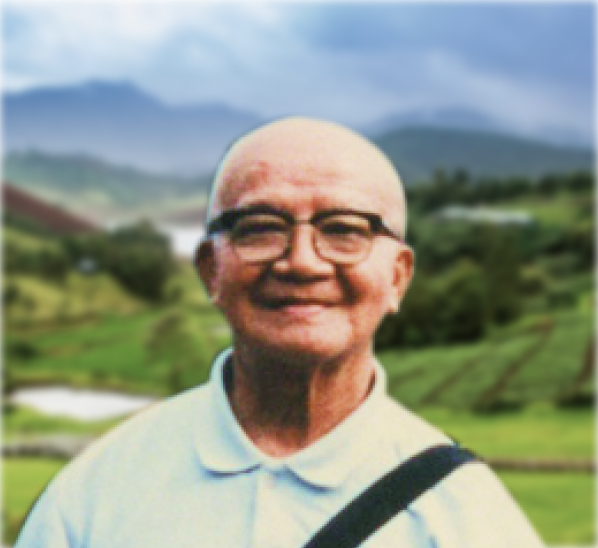- He launched a fundraising campaign and, in just a few months, his first bridge was completed. Since then, HO’s bridges have been rising at the rate of nine a year.
- He arranged for professional engineers and contractors to do the technical work. But he himself could assess the need for a bridge, draw up a plan, purchase the materials, and coordinate with local officials.
- These bridges have motivated many thousands of Taiwanese to devote themselves weekly to the cheerful work of helping others.
- the RMAF board of trustees recognizes his improving rural Taiwan with good deeds and sturdy bridges.
On any given Sunday morning in the small city of Chiayi in south-central Taiwan, a merry band of citizens can be seen boarding trucks and riding off to the countryside. In private cars and on motorcycles, others join the convoy until, from near and far, they all assemble at a single site beside a river. Donning bamboo sun hats and baseball caps, the pilgrims take up shovels and hoes, baskets and pails, to build a bridge. Leading the party will be seventy-three-year-old HO MING-TEH, a bald and jolly Pied Piper who has built more than two hundred bridges in Taiwan’s Yunlin, Chiayi, and Tainan Counties during the past twenty-five years.
HO MING-TEH, a devout Buddhist and former grocer, had already embarked upon a few modest projects, mending local roads and suspension bridges, when in 1971 a flood swept away an old wooden bridge in nearby Chungpu Township and took the lives of two brothers. As HO well knew, the countryside was full of decrepit wooden bridges. Moreover, no bridges at all spanned many of the region’s rivers and streams; to reach towns and markets, rural folk had to ford them. Bridges were needed – proper concrete bridges. HO resolved to build them.
Straightaway, he launched a fundraising campaign and, in just a few months, his first bridge was completed. Since then, HO’s bridges have been rising at the rate of nine a year.
Although trained as a youth in civil engineering, HO was not a professional bridge builder. He arranged for professional engineers and contractors to do the technical work. But he himself could assess the need for a bridge, draw up a plan, purchase the materials, and coordinate with local officials. He could also raise the money. To emphasize the spirit of giving, HO limited individual contributions to just a few dollars per project; yet private donations have yielded all the money needed for HO’s many bridges: more than U.S.$12 million over the years. In addition, HO invited everyone to join him each Sunday in the good deed of bridge-building, performing the many simple chores that require no technical skill. More than two hundred thousand volunteers have done so.
HO organized his projects casually, at first with no formal organization at all. But as one new bridge after another rose at his initiative, local newspapers anointed HO and his partners the Chiayi Philanthropy Group. He adopted the name formally on the day he inaugurated his one-hundredth bridge. Up till now, however, HO’s organization?which also helps poor families meet burial expenses?has no membership list or formal charter. Whoever chooses to contribute, contributes; whoever wishes to work, works. HO himself keeps the books, and his scrupulous reports to donors have earned the Chiayi Philanthropy Group a reputation for unshakable integrity.
HO’s concrete bridges vary in length from just a few meters to over one hundred; with distinctive white railings, each one is a replica of the other. Simple and strong, they dot the countryside, moving farm products swiftly and efficiently to market, opening once remote areas to tourism, and rendering daily travel safer. They are an incalculable practical boon to the people of Yunlin, Chiayi, and Tainan Counties.
But they are also something more. These bridges have motivated many thousands of Taiwanese to devote themselves weekly to the cheerful work of helping others. HO MING-TEH, the inspiring force, seeks no credit. Buddhism, he notes, enjoins its followers to do good. And so he does.
In electing HO MING-TEH to receive the 1995 Ramon Magsaysay Award for Community Leadership, the board of trustees recognizes his improving rural Taiwan with good deeds and sturdy bridges.
It gives me great pleasure this evening to be the recipient of the 1995 Ramon Magsaysay Award for Community Leadership. First of all, I would like to express my sincerest appreciation to the board of trustees of the Ramon Magsaysay Award Foundation for bestowing upon me this special honor.
However, I must reiterate that I am just a member of the eighty-thousand-strong Chiayi Philanthropy Group in the Republic of China on Taiwan. In the past twenty-odd years, believing that “doing good is the greatest source of happiness” and that “to do good is to invoke Heaven’s blessings and accumulate virtues,” all the group members have worked together to construct a total of 215 bridges in Taiwan’s rural areas. In building these bridges, our hearts are overflowing with joy and we have never entertained any thought of being awarded for what we have done. It is our belief that bridges will not only facilitate transportation but also bring people closer together psychologically, thus conducing to a happy and harmonious society. Therefore, this award is not so much a personal commendation as a recognition of what the group as a whole has been doing. We are committed to building even more bridges to benefit even more people.
In closing, I wish to pay my high tribute to what the Ramon Magsaysay Award Foundation has achieved over the past decades by setting up awards in memory of the late President Ramon Magsaysay to advocate freedom, universal love, and justice. It is my earnest hope that the Foundation will encourage more people to do good and to march toward a bright future, thus contributing toward peace and stability worldwide.

